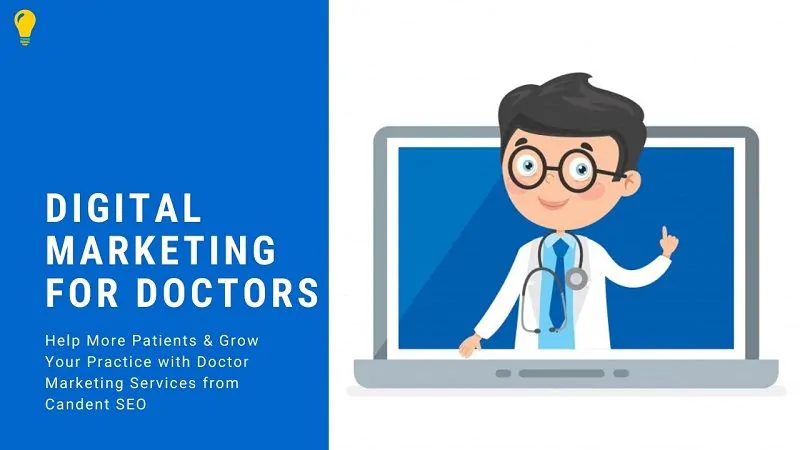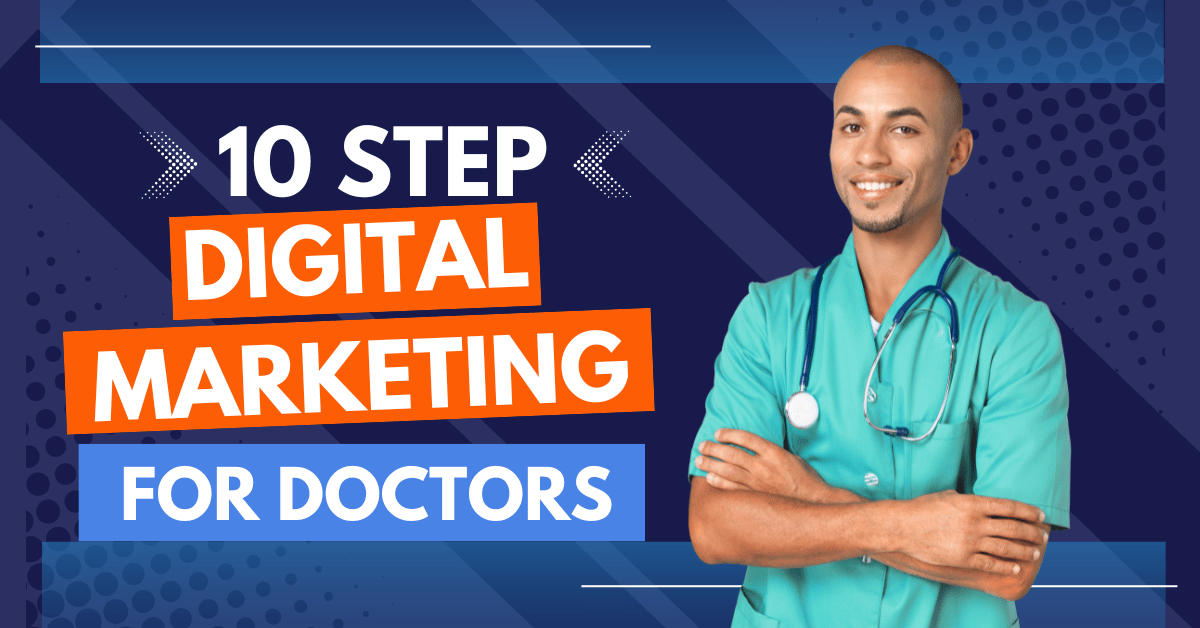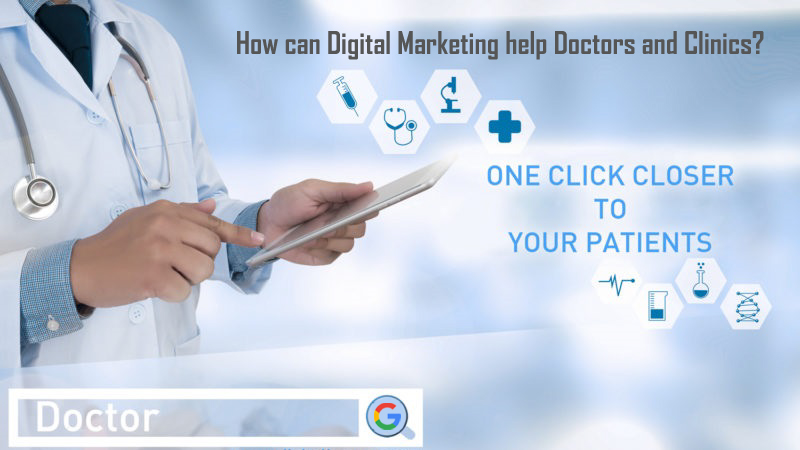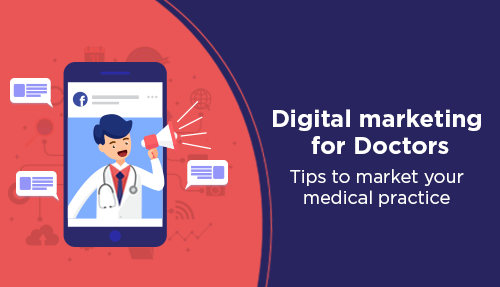The healthcare industry is undergoing a digital transformation. It’s essential for physicians to adapt to the digital age, not only to keep up with technological advancements but also to meet the evolving expectations of patients. Digital marketing has become a vital tool in this transformation, enabling doctors to reach more patients, build their practices, and improve patient care.
Toc
This article will explore three key aspects of digital marketing for doctors—telemedicine, local SEO, and content marketing strategies. By leveraging these tools, physicians can revolutionize their practice and enhance patient engagement.
Introduction of digital marketing for doctors

Digital marketing is the use of digital channels, such as social media, websites, and email, to promote products or services. In the healthcare industry, digital marketing for doctors involves using various online platforms to reach potential patients and provide them with valuable information about their practice. With the rise of social media and search engines, patients are now actively seeking healthcare information online. As a result, it has become crucial for doctors to have an effective digital marketing strategy to connect with their target audience.
Definition of Telemedicine
Telemedicine is the use of digital communication technologies to provide and support long-distance clinical healthcare, patient and professional health-related education, and public health and health administration. It allows doctors to consult with patients via video calls, conduct remote diagnoses, and even prescribe medication without the need for an in-person visit. This not only makes healthcare more accessible for patients who live in remote or underserved areas but also provides convenience for those with busy schedules.
Benefits of Telemedicine
Telemedicine offers numerous benefits, both for patients and healthcare providers. For patients, it eliminates the need for travel, reduces waiting times, and provides access to specialists who may not be available locally. It also helps in managing chronic conditions by making regular follow-ups easier and more consistent. For healthcare providers, telemedicine can help in reducing the overhead costs associated with maintaining a physical office, optimizing the workflow, and reaching a broader audience.
Composition of Digital marketing for doctors

Digital marketing for doctors comprises various strategies and tactics that work together to promote a medical practice. These include:
Telemedicine: A game-changer in the healthcare industry
Telemedicine is the use of technology to provide remote clinical services to patients. It allows doctors to consult with patients virtually through video conferencing or messaging platforms. This technology has been gaining traction in recent years, especially during the COVID-19 pandemic when many clinics had to shut down physical operations. By incorporating telemedicine into their practice, doctors can expand their reach and provide convenient, accessible care for patients, regardless of their location. This not only improves patient satisfaction but also increases the efficiency of healthcare delivery.
Local SEO: The key to ranking higher in online searches
Local search engine optimization (SEO) is a crucial aspect of digital marketing for doctors. With the majority of patients turning to search engines when looking for a new doctor or researching health conditions, it’s essential for doctors to have a strong online presence. Local SEO involves optimizing your website and online listings to appear higher in local search results. By implementing local SEO strategies, doctors can attract more patients from their target geographical
Telemedicine: Enhancing patient access to care
Telemedicine has been a game-changer in the healthcare industry, allowing doctors to provide virtual consultations and treatment to patients. With the increasing use of telemedicine during the COVID-19 pandemic, it has become an essential tool for doctors looking to expand their reach and serve more patients.
From a digital marketing perspective, telemedicine enables doctors to connect with patients who may not have access to traditional healthcare services. This includes individuals living in remote or rural areas, those with mobility issues, and even international patients seeking specialized care. By offering telemedicine services, doctors can attract a broader audience and improve patient access to care.
Content marketing: Educating and engaging patients
Content marketing is another essential aspect of digital marketing for doctors. It involves creating valuable content, such as blog posts, videos, and infographics, to educate and engage potential and current patients. In the healthcare industry, content marketing plays a crucial role in building trust with patients and establishing doctors as thought leaders in their field.
By regularly creating informative and relevant content, doctors can provide patients with valuable information about their practice, services, and health conditions. This not only helps to enhance patient education but also improves patient engagement and loyalty. Additionally, search engines favor websites with high-quality content when ranking them in search results, making content marketing an essential tool for SEO.
Video Marketing: Engaging Patients Through Visual Content
Video marketing is an increasingly popular and effective strategy for doctors aiming to broaden their outreach and enhance patient engagement. Videos can simplify complex medical concepts, showcase patient testimonials, and provide virtual tours of the clinic, helping to humanize the practice. By creating high-quality, informative, and engaging videos, doctors can effectively capture the attention of potential patients and establish a strong online presence.
Platforms like YouTube, Vimeo, and even social media channels such as Instagram and Facebook can be used to distribute video content. Moreover, videos tend to perform well in search engine rankings, further boosting the practice’s visibility online. Incorporating videos on the practice’s website can also improve user experience and increase the time visitors spend on the site, which can positively influence SEO.
Regularly updating video content and integrating it into various digital marketing strategies can significantly enhance patient education and engagement, making video marketing a valuable tool in a doctor’s digital marketing arsenal.
Telemedicine The Future of Patient Care

The Impact of Local SEO on Patient Acquisition
A solid local SEO strategy is fundamental to attracting new patients and retaining current ones. When potential patients search for healthcare services online, they typically include geographical locations in their queries, such as “dentist near me” or “pediatrician in [city].” By optimizing their websites and local business listings for these local searches, doctors can increase their visibility on search engine results pages (SERPs). This involves practices like claiming and optimizing Google My Business profiles, acquiring positive reviews, and ensuring NAP (Name, Address, Phone number) consistency across all online platforms.
Online Reputation Management: Building Trust and Credibility
In the digital age, a doctor’s online reputation can significantly impact their practice’s success. Patients often turn to online reviews and ratings to make healthcare decisions. Therefore, managing online reputation is a critical component of digital marketing for doctors. Encouraging satisfied patients to leave positive reviews and promptly addressing any negative feedback can help build a strong, trustworthy online presence. Additionally, actively engaging with patient reviews helps to humanize the practice and foster a sense of community and trust.
Utilizing social media platforms such as Facebook, Twitter, Instagram, and LinkedIn allows doctors to connect with their patients on a more personal level. Social media can be used to share health tips, updates about the practice, patient testimonials, and behind-the-scenes looks at the clinic. By maintaining an active presence on social media, doctors can enhance patient engagement, provide additional value, and foster a sense of loyalty and community among their patient base. Social media marketing also allows for targeted advertising, helping doctors reach specific demographics and tailor their messages accordingly.
Email Marketing: Keeping Patients Informed and Engaged
Email marketing remains one of the most effective digital marketing strategies for maintaining ongoing communication with patients. Regular newsletters can keep patients informed about the latest health tips, new services, special offers, and important announcements related to the practice. Segmentation and personalization of email content further enhance patient engagement by delivering relevant information tailored to individual patient needs and interests.
Analytics and Data-Driven Decision Making
The effectiveness of digital marketing efforts can be measured and optimized through data analytics. By tracking metrics such as website traffic, conversion rates, social media engagement, and email open rates, doctors can gain valuable insights into their marketing performance. These data insights enable doctors to refine their strategies, identify areas for improvement, and make informed decisions to maximize the return on investment (ROI) from their digital marketing activities.
Case Studies and Testimonials

Case studies serve as powerful tools to showcase the success stories of a medical practice, illustrating how specific treatments or interventions have led to positive outcomes for patients. By detailing real-life examples of patient experiences, case studies can help build trust and credibility among potential patients. They provide tangible evidence of a doctor’s expertise and the effectiveness of their services. When sharing case studies, it is crucial to maintain patient confidentiality and obtain appropriate consent. Highlighting diverse cases with varied conditions can also demonstrate the practice’s wide range of expertise and ability to handle complex situations.
Testimonials: Amplifying Patient Voices
Patient testimonials are another impactful way to build trust and credibility. Testimonials offer first-hand accounts of patients’ experiences, shedding light on their satisfaction with the care they received. Featuring testimonials on the practice’s website and across digital platforms can provide social proof, encouraging prospective patients to choose the practice. Video testimonials are particularly compelling, as they allow potential patients to see and hear the experiences of others, making the endorsement more personal and relatable.
Integrating Case Studies and Testimonials into Digital Marketing
To maximize the impact of case studies and testimonials, they should be integrated across all digital marketing efforts. This includes featuring them prominently on the practice’s website, sharing them on social media, and incorporating them into email marketing campaigns. By consistently highlighting these success stories and patient experiences, doctors can continuously build and reinforce their reputation as trusted healthcare providers. Additionally, these elements can be optimized for search engines to improve visibility and attract more potential patients searching for reliable healthcare services.
Tips for Effective Implementation

Prioritize User Experience
Ensuring a smooth and user-friendly experience on your website is crucial. This includes mobile optimization, easy navigation, quick load times, and clear call-to-action buttons. Patients should be able to find the information they need and contact the practice effortlessly.
Consistent Posting Schedule
For social media marketing and content creation, maintaining a consistent posting schedule is essential. Plan and schedule posts ahead of time to ensure a steady flow of content. Tools like Hootsuite or Buffer can help manage and automate these posts efficiently.
Leverage Patient Feedback
Actively seek out and leverage patient feedback to continually improve your digital marketing efforts. Conduct surveys, encourage reviews, and listen to patients’ suggestions. This feedback can offer valuable insights for refining your strategies and enhancing patient satisfaction.
Invest in Quality Content Creation
High-quality, informative content resonates more with patients and helps establish the practice as a trusted authority in the medical field. Invest time and resources into creating engaging blog posts, videos, infographics, and other educational materials.
Monitor and Adjust Strategies
Constantly monitor the performance of your digital marketing efforts through analytics tools such as Google Analytics, social media insights, and email marketing metrics. Regularly assess the data to understand what is working and what needs adjustment. Flexibility and willingness to adapt are key to staying effective.
Build a Strong Local Presence
Incorporate local SEO strategies meticulously. Ensure that your practice’s NAP (Name, Address, Phone number) is consistent across all online directories. Engage with local communities through social media and sponsor local events to build a robust local presence that encourages patient loyalty.
Use Automation Tools
Implement marketing automation tools to streamline repetitive tasks such as email campaigns, appointment reminders, and social media postings. This enables you to focus more on personalized patient interactions and high-level strategy planning.
Foster a Strong Online Review Strategy
Actively manage your online review strategy by routinely asking happy patients to share their experiences online. Address negative feedback promptly and professionally to show potential patients that you value their opinions and are proactive in resolving any issues.
By focusing on these practical tips, doctors can enhance the effectiveness of their digital marketing efforts, ensuring a broader reach and more engaged patient base.
Conclusion

In conclusion, digital marketing has become an indispensable tool for doctors looking to expand their practice and provide exceptional patient care. By implementing strategies such as local SEO, online reputation management, social media engagement, email marketing, and leveraging data analytics, doctors can stay ahead in the competitive healthcare landscape. The integration of case studies and testimonials further enhances credibility and trust, making it easier for potential patients to choose their services.
As the digital world continues to evolve, it is crucial for healthcare providers to stay updated with the latest trends and technologies. This not only helps in reaching a broader audience but also in delivering personalized and effective care. Embracing digital marketing is no longer an option but a necessity for practices aiming to thrive in the modern healthcare environment.











